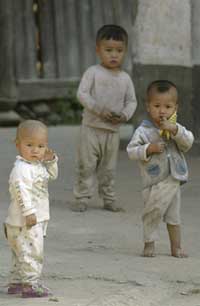Chinese government partly to blame for problem of too many boys
China says it will not loosen its so-called one-child policy, despite a top family planning official's acknowledgment Tuesday that the policy was partly to blame for creating the problem of too many boy babies and not enough girls.

A baby boom generation born in the early 1980s has reached marriage and childbearing age, risking another massive population boom in China if restrictions are dropped, said Zhang Weiqing, minister of the National Population and Family Planning Commission.
Since the late 1970s, China has limited urban couples to one child and rural families to two children to control the population and conserve scarce natural resources.
Beijing contends that the policy has helped prevent 400 million births and has aided rapid economic development.
Zhang said many migrant workers living in cities have been evading restrictions by having two or more children. He did not give figures.
Both factors have prompted the government not to alter the basic policy, which had been reviewed and renewed without change last month, he said.
However, he acknowledged that the policy has accelerated a growing gender imbalance among newborns, with some 118 boys born for every 100 girls in 2005.
There are fears the imbalance could lead to many men being unable to find mates in coming decades.
The policy and easy availability of sonogram technology to determine fetal gender have led many families to abort baby girls.
Zhang would not give statistics for the annual number of abortions performed in China.
"This problem is a reality of country life in China," said Zhang. "We have a 2,000-year feudal history that considered men superior to women, that gave boys the right to carry on the family name and allowed men to be emperors while women could not."
Zhang said the government has committed to solving the imbalance within 10 to 15 years with education campaigns, punishments for sex-selective abortions, and rewards like retirement pensions for parents who have girls.
In some regions, the figure has hit 130 boys for every 100 girls, while the average for industrialized countries is between 104 and 107 boys for every 100 girls.
China is the world's most populous nation, with about 1.3 billion people 20 percent of the global total. The government has pledged to keep the population under 1.36 billion by 2010 and under 1.45 billion by 2020, Zhang said.
While popularly referred as China's "one child policy," the rule limits only 35.9 of the total population to having one child, said Wang Guoqing, the commission's vice director.
Most people, or 52.9 percent, are allowed to have a second child if their first baby is a girl, Wang said. Poor farmers with a two-child limit account for 9.6 percent, while ethnic minorities allowed to have two or more children make up 1.6 percent of the total.
The complex policy reflects the greatly varied economic and social realities in different Chinese regions, Zhang said.
He said the government has begun studying the impact on China of a generation of "only children."
Since the policy began in the late 1970s, nearly 100 million children have been born who will never have siblings.
"China's only boys and girls are certainly not as scary as some people say, like those who call them 'little emperors' or 'little titans' who can't tolerate authority," said Zhang, reports AP.
"As I understand, the majority of them have had a healthy childhood," he said. "You can see for yourself. Young people today are very energetic and creative."
He said they were likely to be better educated and more talented than kids from bigger families, because parents expend more resources on them, for example, pushing them into different classes at a young age.
"I really appreciate their contribution to our nation," said Zhang, 62. "They are much better off than I was, being one of four kids," said Zhang, 62. "I admire them."
Subscribe to Pravda.Ru Telegram channel, Facebook, RSS!




